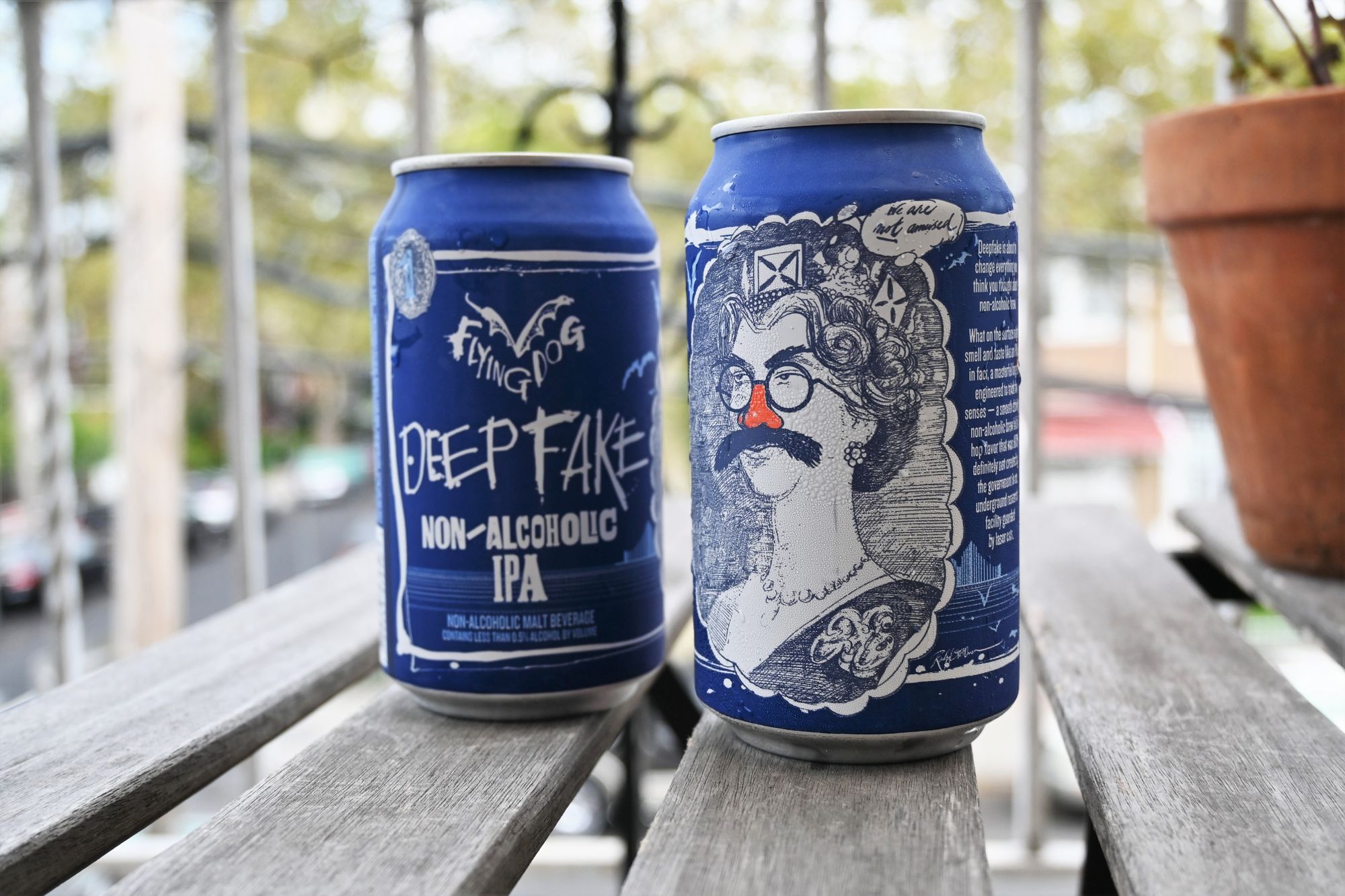For a few nights after this website launched, my subconscious attempted to unknot the many silly little anxieties that I'd rushed past too quickly to process. One night, I had a prolonged stress dream about my cofounders changing the 404 Media logo to be in Ralph Steadman’s style—the artist best known for illustrating Hunter S. Thompson’s Fear & Loathing in Las Vegas, and also Flying Dog brewery's labels.
Steadman is a great artist, no beef with him whatsoever, but this dream-logo looked like dogshit. Dream-me was not pleased. I woke up super pissed off, then made a joke about it to my colleagues (who would never do such a thing in waking life). Three days later, Emanuel dropped a link in Slack for Flying Dog brewery’s non-alcoholic IPA beer named Deepfake.
Deepfake the beer was first released in 2021, and people who seem to know what they're talking about when it comes to non-alcoholic beers liked it. Non-alcoholic beers have come a long way—I think the first (and last) one I ever had was an O’Doul’s, and this is definitely better than that.
Deepfakes the technology came out in 2017, and I was the first to cover it, and as far as I know, the only journalist who managed to talk to the person who developed it. If I could go back in time and tell me then—when deepfakes were just some Reddit guy's username and shorthand for morally and imaginatively deficient AI -generated versions of nudie magazine paste collages—that a major brewery would someday name a beer "Deepfake," I would probably believe it and find it kind of stupid. And I'd ask if it's any good. To which I’d be forced to answer: It's fine.
Deepfake in this context is a play on the beer being a "fake" IPA that can fool a drinker into thinking it's the real, alcohol-containing kind. And like deepfakes the technology, if you get a little too close, it starts to fall apart.
After Emanuel dropped that link, I wrapped up for the day and got on the G and headed to the nearest Whole Foods to get a sixer of this stuff.
Being spotted by anyone I know buying a non alcoholic beer called DEEPFAKE and nothing else would bring about the end of my life, so I sweated it out in line for the cashier and searched the trademark and patent database for deepfake, and found that Flying Dog filed to register the work mark in 2020.
At this point in the journey I’m wishing I knew what my old Reddit penpal u/deepfakes thought about his username becoming not just the word for a specific type of generative adversarial network powered face swap used primarily by horny programmers in their spare time, but an entire cottage industry of research departments, PhD programs, lots of “deepfake detection” startup grifting, Department of Defense initiatives, and a mid NA beer. I’m not against using the word on beers, or anything at all, but it’s interesting that someone’s username from an online forum for producing better and more realistic nonconsensual porn can be trademarked by a brewery.
“Deepfake” as a descriptor escaped the bounds of its original definition long ago, though, and is now used as shorthand for not just 1:1 swapped identity, but anything algorithmically faked that positions someone as doing or saying something they didn’t, including audio. The entire concept is about to be mowed over by generative AI, which creates new scenarios wholesale, no basis in reality required.
It’s still weird, though, to see the word in the wild, in any other context than AI. A year ago I was sitting in a dive while Jeopardy! played on the TV above the bar, and one of the answers was “what are deepfakes.” I don’t feel any ownership over the word—I reported on something that happened, and if anything, it belongs to that one Redditor—but it was vertiginous to see it on a screen like that, as a trivia answer. It’s so far detached from the technology that I know to be actively life-ruining for a lot of people, primarily women, that it’s a jolt of cognitive dissonance to see it used any other way.
But that was the case right out of the gate: almost immediately after we started reporting on deepfakes, as a way to own women’s bodies and manipulate, shame, and steal from them, the hype cycle got ahold of them and twisted these real problems into a panic about whether an AI-generated Trump could launch a nuke. Deepfakes in their original form, as a tool for creating non-consensual sexual images, still thrive online in their own economies, and haven’t strayed far from their original use except to become a lot easier to make and more believable to watch. But to the mainstream, which uses the technology to sell Volvos and promote ESPN documentaries, it’s a tool for marketing, and people are blasé enough about it to sell it as a beer.
Waiting for my number over the checkout line speakers, I thought about how I’d like nothing more than to crack open a cold Deepfake with u/deepfakes today and ask him what he thinks of all this. He started something the importance of which I’m not sure he grasped fully at the time. On the train home, I tried to figure out what stage of simulacra the beer lands in, and decided I needed a real one immediately after I tasted this fake one.
Best illustration of Baudrillard’s theory
by u/Infinitarium_ in PhilosophyMemes
I got home, chilled it for 20 minutes, cracked one open, and felt sad for the above reasons but also because it just wasn’t very good. I had an IPA phase in my early 20s just like everyone else–being a millennial striver in 2011 and hanging out with servers, bartenders and severely depressed newspaper reporters in a midsized East Coast mountain town will absolutely do that to a person. But I've been over that phase since the last time I drank too many IPAs while trying to keep up with a group of functioning alcoholics and almost poisoned myself. If I had more than one IPA today it might hospitalize me, but I still know what one is supposed to taste like.
This one wouldn’t fool me. It tastes like if someone drinking an IPA burped in your direction while you took a sip of a High Life (which is also something I'm familiar with). It’s too watery and weak to be a faithful copy of something like Flying Dog’s Raging Bitch, one of my favorite IPAs back when I tried to burn my stomach lining off with them four days a week. But, for someone who’s trying to cut down on beer but craves an IPA, or isn’t drinking for health or pregnancy reasons, I can see how it’d be a fine swap.
Existentially blue-balled by the Deepfake and sweaty from an extracurricular train trip, I opened the only other beer in my fridge, a Corona. At least a Corona has a flavor, even if it's like licking the surface of a card table. I drank another Deepfake the next day at lunch time, to see if it hit different in the daylight, and my impression stayed the same — but it did give me a headache by 3 p.m., which is accurate to my real IPA experience.
The can design is kind of interesting. The copy on the side is kind of Epic Bacon, “100% definitely not created by the government in an underground research facility guarded by laser cats,” but I think that's probably just Flying Dog's audience. At least they got the word correct. It's one word, "deepfake.”


